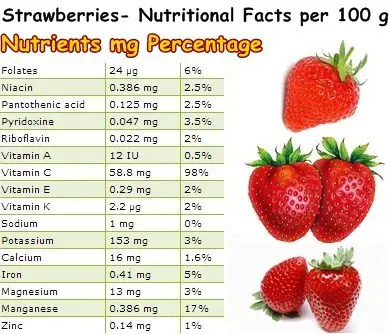Strawberries not only rank as one of the most popular fruit choices ever, but they are also among the richest in antioxidants, molecules capable of slowing down the aging process by preventing oxidation at cell level.
They are also one of the best food sources of vitamin C, a strong natural antioxidant and anti-inflammatory vitamin. Strawberries are surprisingly rich in manganese, a dietary mineral with anti-inflammatory properties and benefits for bone strength.
They further contains small amounts of essential B vitamins for energy metabolism and brain health, including folate which is good for pregnant women.
The main disadvantage of strawberries is that they have allergenic potential and represent one of the most common food allergies in children. The fruits are also surprisingly fragile, highly perishable. On average, they can be kept for a maximum of two days without significant loss of vitamin C and antioxidant polyphenols, if they are already perfectly ripe to begin with. Cooking strawberries results in loss of certain nutrients, especially vitamin C, but can reduce allergenic potential in some cases. Research suggests the fruit is especially good for cardiovascular health as a result of a good fiber content and presence of certain beneficial compounds.

What do strawberries look and taste like?
Different cultivars vary in colour, shape, size and, to a lesser extent, taste, yet most look to offer some standard characteristics. Strawberries are small, plump, bright red, teardrop-shaped fruits. The tiny, yellowish seeds embedded in the flesh of the fruit are actually fruits themselves and contain the real seeds. Strawberries have a juicy, but crisp flesh, sweet-tart flavor and unique aroma with a strong, but pleasant fragrance.
You can actually tell you have eaten a perfect strawberry when your entire mouth smells like one. The unripe fruits are green colored with a tough texture and a rather bland, sometimes tart taste, depending on ripeness.
Nutrition facts and benefits
If you were wondering what are the health benefits of eating strawberries, then check the facts below:
Anti-inflammatory properties
Strawberries have strong anti-inflammatory properties due to their unique combination of naturally-occurring antioxidants which include anthocyanins, flavonols, terpenoids and phenolic acids. They also contain an anti-inflammatory antioxidant similar to resveratrol, called fisetin. This particular compound has been found to actively reduce inflammation levels by inhibiting the action of specific inflammatory cytokines.
Vitamin C found in generous amounts in strawberries further holds anti-inflammatory benefits and all of these compounds together can help reduce inflammation levels in the body and provide relief for chronic inflammatory conditions such as rheumatoid arthritis and others. Studies say that if you are suffering from chronic inflammation and you consume roughly one cup of strawberries per day, several days a week you will most definitely see an improvement in your condition. There are numerous scientific papers that suggest eating strawberries regularly (3-4 days a week) can help alleviate symptoms of chronic inflammation.

Antioxidant benefits
Anthocyanins which give strawberries their red color, vitamin C responsible for their tartness and all other aromatic compounds in the fruit, including ellagic acid and its related compounds in the seeds, exert an antioxidant action. Antioxidants essentially protect cells from harmful byproducts such as reactive oxygen molecules (free radicals) and prevent cell damage that gives rise to inflammation, mutations and disease.
Good for the heart and blood vessels
Strawberries are full of antioxidant and anti-inflammatory compounds with important benefits for cardiovascular health. These compounds scavenge harmful free radical molecules, preventing damage to cells and promote heart and vascular health. Vitamin C in particular holds anti-inflammatory properties and helps regulate lipid metabolism, with long-term benefits on blood cholesterol levels. With 2 g of dietary fiber per 100 g, strawberries further help regulate blood cholesterol levels, contributing to lower total and LDL cholesterol.
But in order to enjoy such benefits, studies suggest regular consumption of strawberries should extend over a period of time of at least 30 to 90 days. At the same time, it is recommended to not exclude other fruits from your diet and continue to enjoy a varied and balanced eating regimen.
Rich in vitamin C
According to several studies conducted at national level in various countries, strawberries boast a high content of vitamin C. How much vitamin C in strawberries? There are 58.8 mg (milligrams) of vitamin C in 100 g (grams) of ripe strawberries which is roughly the equivalent of 70% of the recommended daily intake (RDI) of vitamin C for the average adult.
Thanks to their generous content of the nutrient, the fruits play a crucial part in increasing longevity by reducing inflammation and strengthening the immune system. Vitamin C is a basic essential vitamin, one that our body cannot produce by itself and thus requires from dietary sources. Out of all commonly available food sources, strawberries are an excellent option.

Anti-aging properties and benefits for skin
The vitamin C in strawberries boosts collagen production in the skin, contributing to improved elasticity and less wrinkles. Other antioxidants in the fruit, B vitamins and high water content of over 90% further promote strawberries as a good food to eat for skin health.
Good source of manganese
There are 0.386 mg of manganese in 100 g of strawberries, amounting to around 17% of the recommended daily intake. Manganese is an essential dietary mineral with strong anti-inflammatory and antioxidant properties and benefits for bones.
As one of the good food sources of manganese, strawberries contribute to stronger bones and represent a good food to eat for osteoporosis and osteoarthritis.
A manganese deficiency primarily affects bones and causes frail bones, malformations and stopped growth. Find out what are other minerals to take for good bone density.
Manganese deficiency is also a cause for infertility, impacts carbohydrates and protein metabolism, causes dizziness, muscle weakness and anemia. Strawberries, raspberries, parsley, whole grains are great food sources to get your manganese from both because they have a good content of the dietary mineral and because they are easily accessible foods.
Other benefits of strawberries
Sweet and juicy, strawberries are a delicious way to keep hydrated when it’s hot outside and not only. Their high water content helps maintain good blood volume levels and prevent low blood pressure and fainting.
Another of the biggest benefits of strawberries is they are low in calories. How many calories in strawberries? There are only 33 kcal (kilocalories, calories) in 100 g (grams) of ripe strawberries. Strawberries are further a good source of dietary fiber. How much fiber in strawberries? There are 2 g (grams) of fiber per 100 g (grams) of ripe fruit.
The very low calorie content of strawberries recommends them for weight loss diets. Dietary fiber also provides satiation, further contributing to weight loss benefits. Dietary fiber feeds good gut bacteria and helps grow populations, actively contributing to bowel health, with systemic benefits.
How much sugar in strawberries? With just 4.89 g (grams) of sugars per 100 g (grams), strawberries are a food low in sugar. At the same time, they help combat low blood sugar (hypoglycemia) and associated symptoms such as weakness and dizziness.
The small amounts of B vitamins help boost energy levels and promote brain and muscle health. The small seeds embedded in the fruit are a good source of fiber to help prevent and relieve constipation naturally.
Surprising recent studies have shown that strawberries contain small amounts of Omega-3 fatty acids with an anti-inflammatory action, antioxidant effects and cardioprotective properties. However, the content of Omega-3 in strawberries is too low to produce any measurable health effects on its own.
What are strawberries good for?
Strawberries are a healthy food. Peruse the short list below highlighting the beneficial effects of eating the fruit:
- Reducing inflammation in the body.
- Protecting against chronic inflammatory diseases.
- Relieving constipation naturally.
- Promoting skin and cardiovascular health.
- Supporting healthy weight loss.
- Strengthening bones and a good calcium metabolism.
- Improved fertility thanks to manganese, vitamin C and folate.
- Preventing anemia and muscle weakness.
- More energy and brain health.
How to choose good strawberries
- Look for strawberries from organic agriculture and eat them in season.
- Choose fruits with a stronger fragrance.
- Avoid unripe strawberries. They will not ripen after being harvested.
- Avoid fruits that are too big, flavorless, bitter or bland tasting.
- Tart strawberries are just as god as very sweet ones. The tartness is indicative of a high fruit acid and vitamin C content.
Side effects of strawberries
Did you know that strawberries often cause mild allergic reactions in a great percentage of the population? Fever, hives with itching and redness are common symptoms of strawberry allergy and can appear in as little as a couple of minutes after eating the raw fruit. Studies suggest that such minor allergic reactions are triggered by a protein that gives ripe strawberries their red colour.
As a result, a variety of white strawberries which lack the above-mentioned protein have been developed so everyone can enjoy the fragrant taste of the fruit. Severe allergic reactions to strawberries are also possible and can result in anaphylactic shock.
Children are highly likely to develop allergies to strawberries, despite the fact that most outgrow them. In any case, the fresh fruit and all of its byproducts (jams, ice cream, yogurts, smoothies, milkshakes, pies) should be exclude from the diet of anyone allergic to strawberries.
Conclusion
Strawberries boast a moderate nutritional value with especially good amounts of vitamin C and manganese and small amounts of B vitamins, particularly folate, and iron. They are a great source of antioxidants and anti-inflammatory compounds and provide important amounts of fiber for digestive and cardiovascular health. Overall, the health benefits of strawberries should make us reconsider them as an important addition to our diet, provided we are not allergic to them. Even more, they are fairly easy to grow in a small vegetable garden, a few pots or some terrace space and require water, sunlight and very little care.
